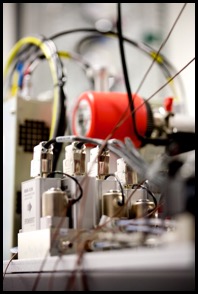Part II year
We believe that the goal of the PartII year is for undergraduates to be involved in cutting-edge science. We aim to provide you with a representative view of academic research by fully integrating you with the work that goes on in our group; in effect a PhD in microcosm.
You will have a self-contained project which is part of the overall trajectory of our research, rather than of ancillary interest to the group. You will be partnered with an experienced post-doc or PhD student, who will be responsible for training you at the beginning of the year, and will support you through the remainder. As such all previous part II students in our group have been authors on at least one peer-reviewed article as a result of their year’s work, and we expect the same from your project!
We want you to work hard, but to do so by being motivated by an excitement in the research. We will not treat you as a lab “robot”, nor enforce strict working hours, but do care about your productivity over the year. The work in our group is very interdisciplinary, and we will give you the opportunity to follow your developing research interests within the framework of the group.
Part II projects

When thinking about potential projects in the group, it might be helpful to consider the skills you are keen to learn. For example: performing state-of-the-art mass spectrometry, NMR, electron microscopy or crystallography experiments; learning how to clone, express and purify a protein; performing biophysical assays in vitro or in cells; designing novel instrumentation or data analysis approaches. While below are some example projects, we will help you make your choice based on your interests!
Structural and dynamical characterisation of a novel molecular chaperone
You will make your own (previously unstudied!) protein from scratch, learning fundamental molecular biology and protein purification skills. Then you will employ an array range of approaches to characterise its molecular details. This would include using mass spectrometry to obtain the mass and size distribution and determining its quaternary dynamics; NMR and biophysical measurements to probe for conformational changes; and biological assays to examine its functional activity.
Small molecule regulation of protein thermodynamics and kinetics
You will screen the influence of small molecules on a potential drug targets for neurodegenerative disease and cardiomyopathy. Using automated mass spectrometry approaches you will quantitatively uncover the effect these molecules have on the interfaces of the target. This will enable the further design of potential drugs based on their ability to recover the functional biophysical state.
Gas-phase approaches for overcoming protein heterogeneity
You will develop novel means for overcoming the difficulties associated with proteins existing in multiple states at equilibrium. You will spend your time developing new instrumentation strategies, and methodological approaches to enable this. Concomitantly you will spend time on complementary computational approaches to aid the objective analysis of complex data. Together this project will provide a lasting means for the study of complex mixtures of proteins.
Developing computational tools for modelling protein structure
You will learn the ropes of how to code in python and/or C++, and the basics of molecular dynamics approaches for studying proteins in silico. With these new skills you will investigate the folding and assembly transitions proteins can undergo, and how these can be manipulated by activation in vacuum. You will be able to use experimental measurements you make to help you restrain your simulations, and to validate them.